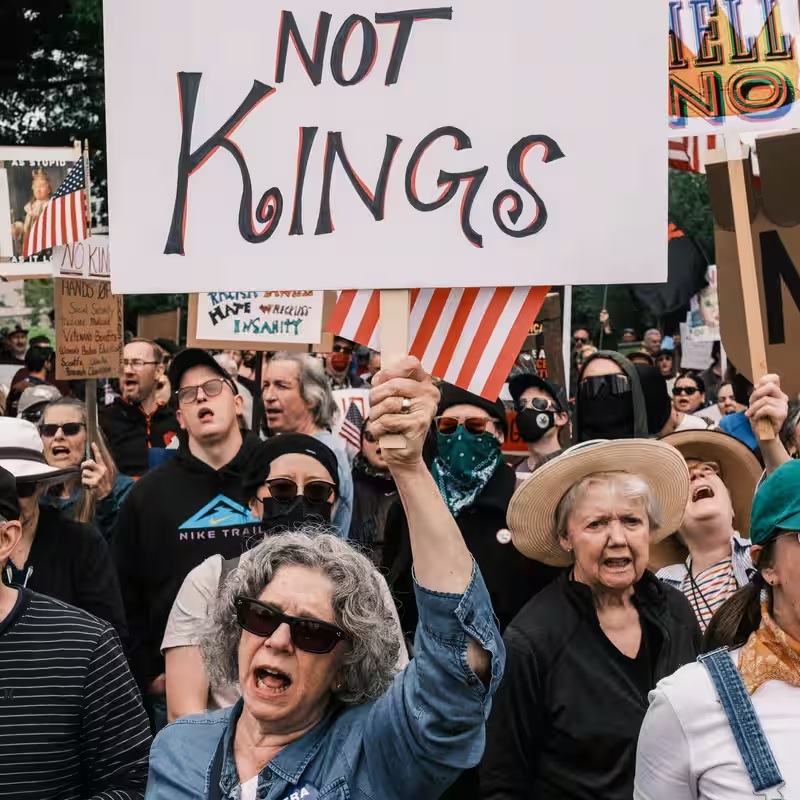Table of Contents
- What Are the ‘No Kings’ Protests?
- Shutdown and Federal Troops: A Volatile Backdrop
- Who’s Behind the Movement?
- Where Are the Protests Happening?
- Celebrity Voices and Public Momentum
- Republican Pushback and Political Fallout
- Sources
What Are the ‘No Kings’ Protests?
More than 2,600 rallies are scheduled across the United States this Saturday under the banner of “No Kings”—a nationwide protest movement aimed at resisting what organizers describe as authoritarian overreach by the Trump administration.
The phrase “No Kings” harks back to America’s founding principles, directly referencing the colonists’ rejection of King George III. Today, it’s being revived as a rallying cry against what protesters see as a dangerous concentration of executive power.
“We are uniting to demand that our representatives take a stand against Trump’s executive overreach,” said Hunter Dunn, a spokesman for the coalition. “We must limit his power and help restore democracy before it’s too late.”
Shutdown and Federal Troops: A Volatile Backdrop
Unlike the first wave of No Kings protests in June—which coincided with President Trump’s 79th birthday and a military parade—the October demonstrations unfold amid a federal government shutdown and the controversial deployment of armed federal agents in cities like Chicago, Portland, and Los Angeles.
Immigration raids conducted by these agents have intensified local tensions, particularly in self-declared “sanctuary cities.” Protesters argue these actions exemplify the very executive overreach they’re fighting against.
Who’s Behind the Movement?
The coalition organizing the No Kings protests includes more than 200 national groups and thousands of local organizations. Key participants include:
- Service Employees International Union (SEIU)
- American Civil Liberties Union (ACLU)
- American Federation of Teachers (AFT)
- Indivisible
- 50501 Movement
- MoveOn
All rallies emphasize nonviolence. Organizers undergo de-escalation training, and the coalition’s website offers public resources on peaceful protest tactics.
Where Are the Protests Happening?
Major demonstrations are planned in every U.S. state, with flagship events in:
- New York City
- Washington, D.C. (outside the U.S. Capitol)
- Los Angeles
- Chicago
- Seattle
- Houston
- Philadelphia
Smaller towns and rural communities are also hosting local gatherings. In June, Boston saw an estimated one million attendees when the rally merged with the city’s Pride festival—a record that organizers hope to surpass this weekend.
Celebrity Voices and Public Momentum
Hollywood actor Robert De Niro has emerged as a vocal supporter, releasing a video message ahead of the protests. “We’ve had two and a half centuries of democracy… Now we have a would-be king who wants to take it away: King Donald the First,” De Niro said, urging citizens to “rise up nonviolently.”
Online sign-ups for Saturday’s events have already doubled compared to June, even though registration isn’t required—a sign of growing grassroots energy.
Republican Pushback and Political Fallout
Republican leaders have sharply criticized the movement. House Speaker Mike Johnson dismissed the protests as a “hate America rally” and baselessly claimed participants were being paid. He also accused House Democrats of delaying government reopening to accommodate the rally.
Treasury Secretary Scott Bessent echoed the sentiment on Fox Business: “‘No kings’ means no paychecks. No paychecks and no government.”
Despite the political backlash, organizers insist the movement is strictly nonpartisan in spirit—focused not on party politics, but on constitutional guardrails.
Sources
The New York Times: What We Know About the Latest ‘No Kings’ Protests
American Civil Liberties Union
Indivisible Movement




